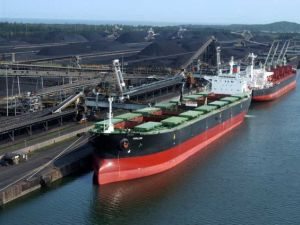
[miningmx.com] – THERE’S little evidence to show that the South African coal mining sector and Government are working together. Take the last two days at the McCloskey Coal Export Conference in Cape Town where privately-financed expansions and business growth initiatives set out plans that provided a disconnect to Government’s inward-looking domestic concerns.
An initiative by London Commodity Markets and the Johannesburg Stock Exchange (JSE) to establish a coal futures market, and supported by creating ‘inland terminals’, is a laudable move. In its effort to provide physical delivery backing the coal trades, the joint venture partners will provide small, black-owned businesses with a route to export markets without having to win entitlement at Richards Bay Coal Terminal (RBCT), currently the source of some friction, one hears, between Transnet and the terminal.
Unfortunately, there’s a risk the inland terminals will rub Eskom up the wrong way. That’s because the proposed terminals also provide Indian buyers of coal with greater access to relatively cheap, low-grade coal that may previously have been purchased by Eskom. The terminal idea also runs in parallel, but not necessarily in unison, with the public enterprises department’s idea announced last year to create coal pantries allowing black-owned companies to beneficiate their coal. As we know, this is a major deliverable of amended minerals legislation.
A proposal by RBCT to expand its capacity to 110 million tonnes/year (Mtpa), and even possibly 140Mtpa, is not news; it has been mentioned before. It’s also not a slam dunk either, even though newly appointed CEO of RBCT, the enterprising (and former Transnet executive) Nosipho Siwisa-Damasane gave them new life at the McCloskey conference by saying the RBCT expansion would be ready to roll within two years.
Miningmx is aware Transnet doesn’t quite see the expansion as quite so effortless unless it opens up more capacity to black-owned exporters. Quite apart from the fact Government policy disconnects here with its interest in securing coal for Eskom, there’s also a threat Transnet might build its own terminal at Richards Bay expressly for this purpose. It’s even rumoured that unless RBCT makes a proposal to open up its added entitlement to black coal exporters, Transnet will push ahead with its own terminal when it announces its year-end results later this year.
In some respects, business can’t be blamed. After all, it’s a labyrinth of note deciding what of government’s statements reflect policy and which are debate. Coal was identified as a strategic report, and therefore subject to possible export levies at the Mangaung conference, but mines minister, Susan Shabangu, says nothing is decided. There may be an export tariff, there may not. Clarity please.
Ian Hall, head of the steering committee of the South African Coal Roadmap, an organisation that has something to do with setting out the industry’s position on its future, bemoans the lack of clarity. “Create an environment that is conducive to new investment . [and provide] clarity on amendments and practical implications of declaring coal a strategic resource,’ he said at the conference.
Well said, although the roadmap is a bit lily-livered in some respects. A report on scenario-planning, at least two years in the making, will be published at the end of this month. Disappointingly, it doesn’t seek to enter the policy-making debate. This is partly owing to the fact that it couldn’t achieve consensus on anything. The roadmap is supposed to unite the interests of unions and government. That hasn’t been achieved.
Melinda Moore, executive for bulk commodity sales, trading and strategy at Standard Bank in London, is aghast at South Africa’s apparent impotence in the minerals market. “There’s too much micro finger-pointing,’ she declared. “You missed the entire bull market in minerals for eight years. Do you know that?’ she asked. “Just get on with it’.











